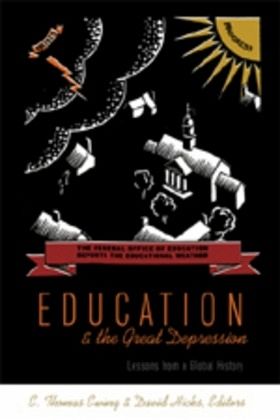
Education and the Great Depression
Lessons from a Global History
Herausgegeben: Ewing, E. Thomas; Hicks, David
Versandkostenfrei!
Versandfertig in 6-10 Tagen
40,50 €
inkl. MwSt.

PAYBACK Punkte
0 °P sammeln!
Education and the Great Depression: Lessons from a Global History examines the history of schools in terms of pedagogies, curricula, policies, and practices at the point of intersection with worldwide patterns of economic crisis, political instability, and social transformation. Examining the Great Depression in the historical contexts of Egypt, Turkey, Germany, Brazil, and New Zealand and in the regional contexts of the United States, including Virginia, New York City, Cleveland, Chicago, and South Carolina, this collection broadens our understanding of the scope of this crisis while also loc...
Education and the Great Depression: Lessons from a Global History examines the history of schools in terms of pedagogies, curricula, policies, and practices at the point of intersection with worldwide patterns of economic crisis, political instability, and social transformation. Examining the Great Depression in the historical contexts of Egypt, Turkey, Germany, Brazil, and New Zealand and in the regional contexts of the United States, including Virginia, New York City, Cleveland, Chicago, and South Carolina, this collection broadens our understanding of the scope of this crisis while also locating more familiar American examples in a global framework.












